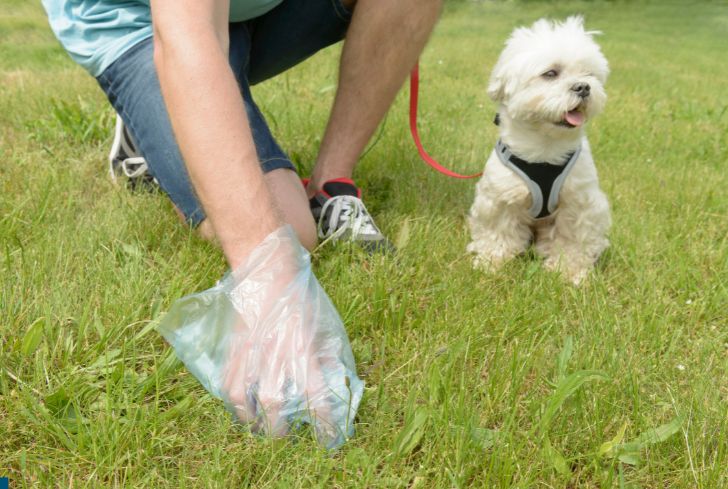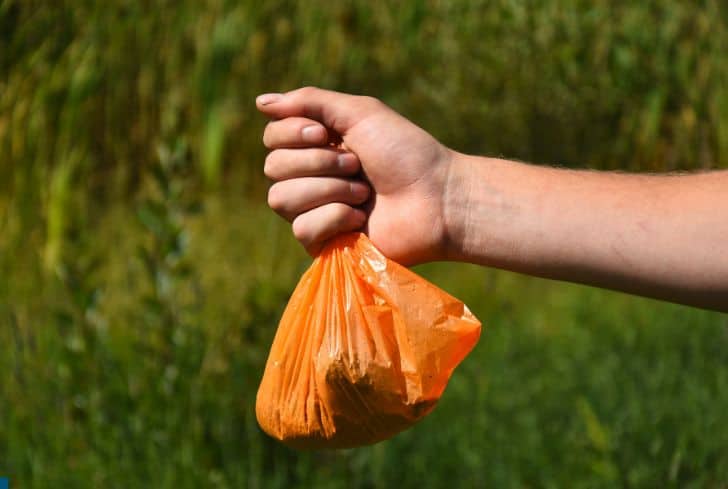The average fur kid should poop at least two to three times daily. And puppies do it at least five times.
Even if you don’t have more than one dog, we can all agree that your yard will get full in no time. And those with more than two dogs, well, that is another story for another day.
So, where does it all go? Does dog poop decompose? In this article, you will learn how nature takes care of dog poop and how long it takes to happen. Don’t go anywhere!
Will Dog Poop Eventually Decompose?
Yes, dog poop will eventually decompose. It is organic, making it biodegradable. Given the right conditions, such as heat, microbes, moisture, and oxygen, dog poop will decompose within two months and a week.
Bacteria and other microorganisms that will break down the dog poop in your yard will get to work within the first week.
However, colder weather slows down the decomposition process. Dog poop will finally break down after a year in this condition because of the rigid atmosphere.
You have hit the jackpot if you have a yard where your dog can easily do their business without your supervision.
Of course, you are expected to clean up after your pet, but it is not uncommon to forget a few mounds here and there. If the smell is not a problem, can you leave it to nature?
It is organic waste, which means it will break down within a considerable time. However, the ecosystem needs factors like adequate sunlight or heat, moisture, microbes and oxygen.
They are readily present in an open yard, so your dog poop will decompose with time.
Does Dog Poop Dissolve in the Rain?
Batches of dog poop littered all over your lawn does not sound like a pleasant idea. But again, scooping four to five times daily is not also appealing, so can you rely on the rain to clean up your dog’s mess?
Dog poop does not dissolve in the rain. In the monsoon season, regular rainfall will simply break down the particles. Before you know it, you will have a bunch of light brown patches all over your lawn.
With continual rainfall, the dog poop will break down into smaller particles that will eventually be washed away. But where does it end up?
Well, in most cases, the millions of pieces of dog poop end up in water bodies. And twenty-five percent of rainfall ends up in the oceans. That may not be a lot, but considering the number of dogs residing in urban areas, we are poisoning our water bodies.
Dog poop is toxic and more acidic than the fertilizer you should use for your garden or lawn. It contains bacteria and parasites that harm biodiversity, including marine life.
Thinking that nature has its way of cleaning up the poop of wild animals is valid but not a good enough reason to avoid scooping your dog’s poop.
For one, there is a difference between a kept animal and one in the wild. We feed our furry friends all sorts of things, much different than what is eaten in nature.
Therefore, we should not expect nature to clean up for us in the same manner. Besides, there are 89.7 million domesticated dogs in the United States. The burden of all that Poop would be too much for nature.
Additionally, the modern landscape is often modified even when sustainable living is involved. As such, you cannot expect the earth to yield the same performance as an untainted portion.
You should not allow rain to wash off your dog poop for several reasons. Later in this article, you will discover interesting and the least tasking ways to dispose of your dog’s poop.
How Long Does it Take for Dog Poop to Decompose?
Dog poop is organic waste, so it will break down given the right environmental factors.
Depending on the weather, this can take a few weeks or months to a year. In the summer, there will be enough heat to decompose the dog poop, and the process will start immediately after the first week.
On the other hand, dog poop may decompose in a year when the weather is chilly. It is similar to leaving something in the freezer – the lack of heat will delay the activity of bacteria and fungi.
Dog poop will eventually break down, unlike plastics and other manufactured materials. However, it also has negative impacts on the ecosystem.
For one, the toxicity of your dog’s excreta can make the grass on your lawn brown. And the same applies to their urine.
Do not make the mistake of thinking it will fertilize your lawn, even though it is organic waste. The toxicity level will be too high when it is not exposed to proper biodegradation.
The timeframe it takes dog poop to decompose depends majorly on two factors. First is the type of food your pet eats.

Does Dog Poop Make Good Fertilizer?
It would be a good idea to allow your dog to poop at strategic places in your garden, right? After all, organic waste is excellent for boosting soil and plant growth.
It depends on how you are applying it to your lawn. The proper way to use dog poop as fertilizer is by composting it. Composting exposes the harmful parasites in a dog’s poop to extreme heat, eliminating them.
The Environmental Protection Agency stipulates that the average dog produces 274 pounds of poop yearly.
Now, wouldn’t that make a desirable supply of fertilizer for plants?
Well, it depends.
Dog poop is different from the excreta that can be found in the wild. Wildlife may eat manufactured foods once in a blue moon, but that’s it.
Their diet is mainly made of natural foods, so their waste will be less harsh on the environment.
On the other hand, dogs eat all sorts of manufactured food. And it is not uncommon to find bacteria and other harmful microorganisms in their excreta.
Mishandling it, such as applying it to crops grown for human consumption, may expose the consumer to diseases.
Besides, there are more than a hundred microorganisms in a dog’s excreta which explain why it stinks so much. Bacteria from a dog’s digestive system and other infections your pet may have will transfer to their poop.
This is why you should not use dog poop to grow food crops for human consumption.
How Fast Does Dog Poop Decompose?
The smell of dog poop is off-putting, and no one is ever okay with it, especially not your neighbors.
It takes 8 to 9 weeks for dog poop to decompose in hot weather. Scientific evidence shows that a gram of dog poop can carry up to 23 million bacteria, with more than a hundred species accounting for the terrible odor.
We hate to break it to you, but eight weeks is enough time for your dog poop to do considerable damage to the ecosystem. You should scoop that poop and dispose of it properly, even though it is your yard.
Dog poop piles up too. You would think you are leaving just one batch and the next until you have a considerable amount.
If you are lucky, the rain will help you break it down, and it will disappear faster. But if that happens, you also put marine life at risk.
The best place to allow dog poop to decompose is a compost pile.
Typically, dogs are omnivores, which means they eat a diet of vegetables and protein.
You can guess which will break down faster – vegetables and plant-based meals will be easier to decompose. Protein, on the other hand, will take longer. This is one of the reasons it is not recommended to leave your pet’s poop in your yard.
Most dogs have highly protein-based diets.
Another factor that determines how long it takes for dog poop to decompose is the climate. When the weather is hotter, it will break down faster.
The timeframe of the decomposition of a dog’s poop looks like this:
- Week 1: The poop will be relatively unchanged and carry high amounts of harmful bacteria.
- Week 2: During the second week, the potency of the bacteria will increase, making it more toxic to the biodiversity or humans that contact it. It will be turning slightly blacker too.
- Week 3: You see a light growth of mold on the surface. Trust that it is coming from the inside, which means microbial activity has started in earnest.
- Week 4: The fourth week sees parasites hatching from the eggs that may have been present in the dog poop.
- Weeks 5 to 8: The risk of bacteria spreading through your dog’s poop increases weekly. It is also at this stage that the grass surrounding the patch of poop starts to die off.
- Week 9: By the ninth week, the poop may be gone entirely, or that is what you think.
The damage that would have been caused will remain. And it will be most apparent through the brown patches of grass that will litter your yard.
Ways to Dispose of Dog Poop
Composting dog waste is the best way to get rid of your canine friend’s poop. It reduces the environmental strain of breeding many dogs in a compact area.
With a small compost bin, some leaves, grass clippings, and sawdust, you can completely solve your dog’s poop problem.
Some tools make scooping poop less tasking; you can get them to make your composting chore easier.
The composted poop can be used to fertilize indoor and garden plants.
You can create a compost bin easily; a garbage can and some leaves will do. Erect the site near your pet’s poop spot for easy access.
The dog poop to carbon waste should be 2 to 1, and add small amounts of water to keep the contents moist.
Since there is source food, i.e., carbon waste, expect microbes to begin the decomposition process in earnest. But you will need to cover the container to trap the heat.
You also need to measure the internal temperature of the compost pile to know when to fluff it. Turn the compost pile after the first two weeks, and fluff now and then to ensure the heat goes around.
But if you don’t have a yard, you can buy a small compost bin that can be placed in the kitchen.
Conclusion
The question of whether it is okay to leave dog poop to decompose on the lawn often raises a heated argument when it is raised among a bunch of dog owners.
Some claim that wildlife already defecates in the environment, so what makes dog poop different? We believe you can now answer that question and will defend the ecosystem when the next subject comes up.






